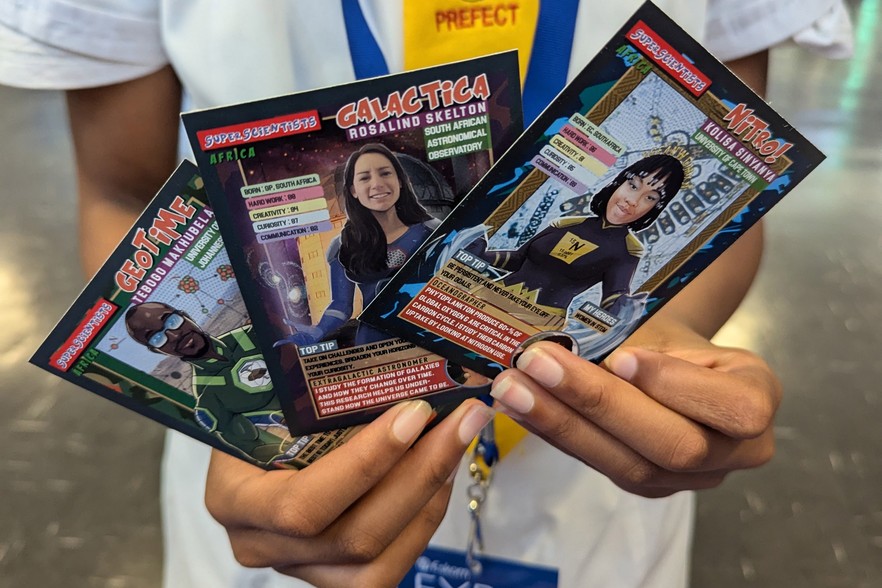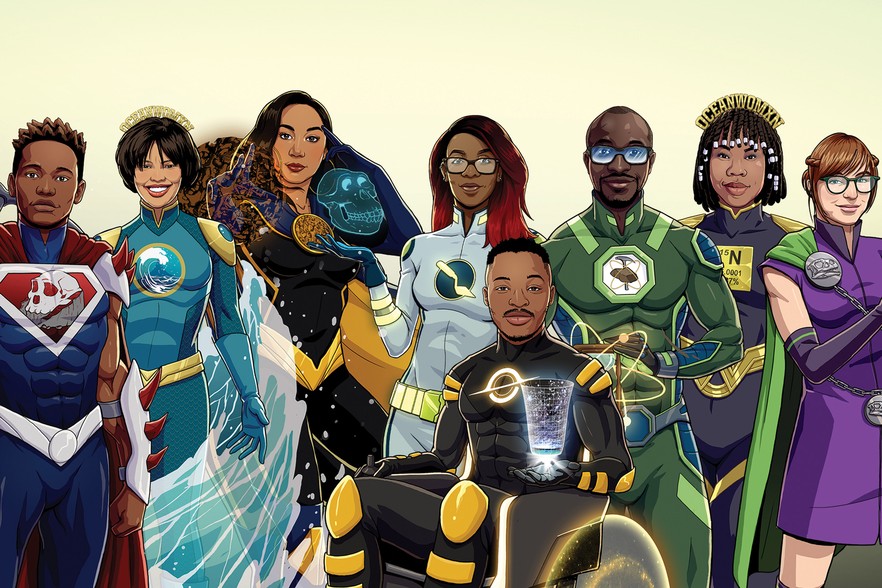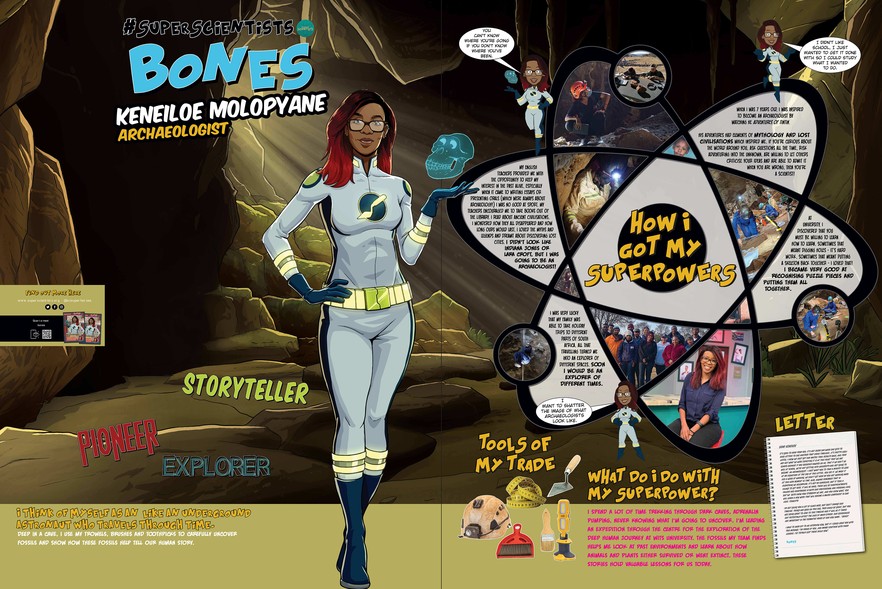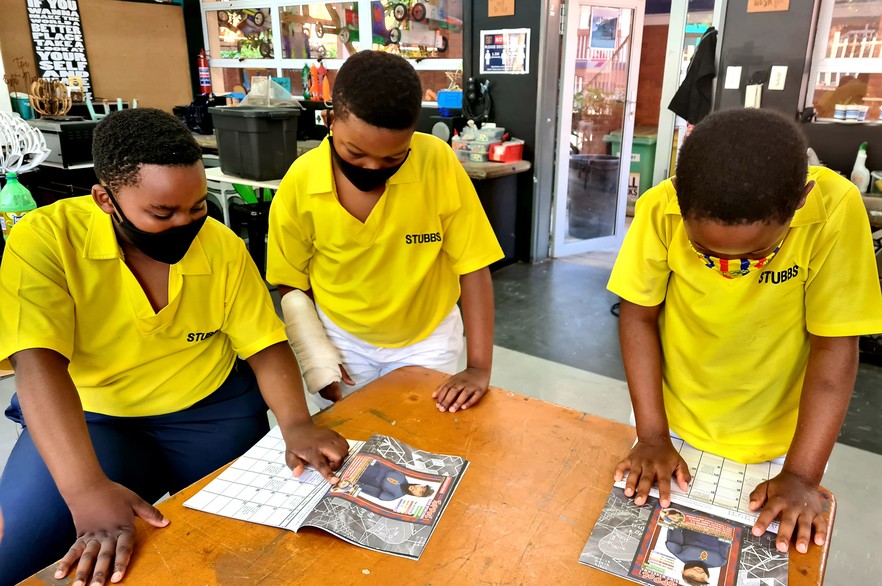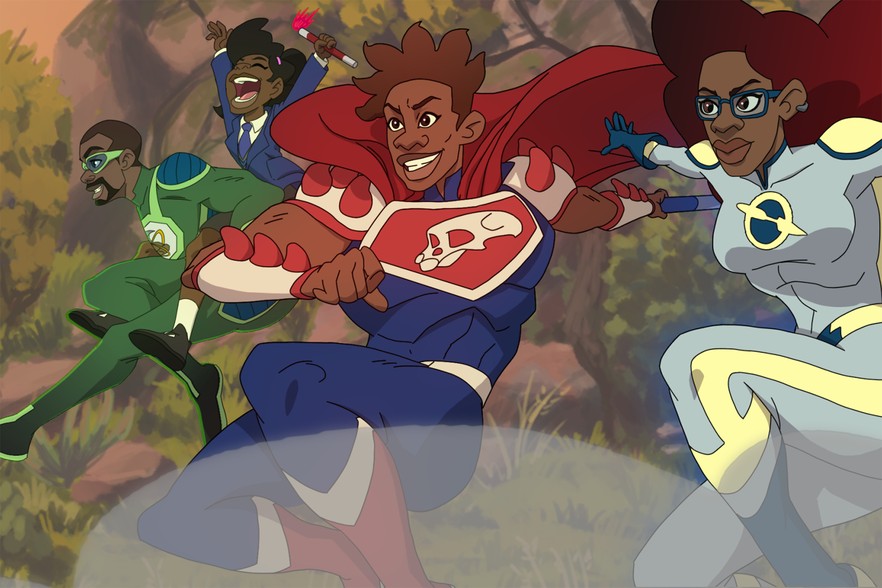Biologist turns real-life African scientists into superheroes
Justin Yarrow and his team have created a series of cartoons they hope will inspire the next generation of scientists
A learner holds up trading cards featuring some of the SuperScientists. This cartoon series, created by Justin Yarrow with a team of local scientists, illustrators and designers, is based on real-life African scientists. Photos: Justin Yarrow/SuperScientists
A scientist who lives and works in Durban has made it his mission to inspire the next generation of scientists by creating a series of cartoon superhero characters based on real-life African scientists.
For as long as he can remember, Justin Yarrow has been intrigued by science and innovation. He obtained his PhD in cell biology and drug discovery before travelling to South Africa from the United States where he started working with local nurses to improve the rollout of antiretroviral drugs in the mid 2000s.
His passion for science and education led him to start an organisation called CodeMakers, focussing on teaching learners at different schools how to do creative coding, cardboard engineering and Lego robotics.
As a way to inspire the learners to one day become scientists themselves, Yarrow began teaching them about South Africa’s scientists. He collected photographs and newspaper clippings of local scientists, made little biographies and stuck them on a bulletin board. But the learners paid little to no attention to his efforts. “They were more interested in taking animations they saw on TV and turning them into their own coding projects,” said Yarrow.
The cartoon series called SuperScientists is based on scientists from Africa. From left to Right: Palaeogeologist Silindokuhle Mavuso (Rocktor), Physical Oceanographer Faith February (Aerosolve), Biological Anthropologist Kimberleigh Tommy (Morpho), Archaeologist Keneiloe Molopyane (Bones), Astrophysicist Mpho Kgoadi (Cosmic Dawn), Geologist Tebogo Makhubela (GeoTime), Oceanographer Kolisa Sinyanya (Nitro), Vertebrate Palaeontologist Kimberley Chapelle (Dinova).
He also noticed learners spending their free time playing with trading cards with different animals on them which were sold by a national supermarket chain.
Sometimes the day-to-day work of scientists may not come across as very exciting but when he thought about it from a different perspective he stumbled upon a solution. “If you are cutting DNA or annealing DNA and making transgenic cells and you’re able to subsequently do all these incredible things, I thought that the work of scientists is like having superpowers,” said Yarrow.
He teamed up with local scientists, graphic designers and illustrators to develop a series named SuperScientists based on real-life local scientists. They started by making trading cards and have now developed an activity book, a museum exhibit, a comic book as well as an upcoming animation based on the SuperScientists characters. Some of the newer characters are based on scientists from across the African continent.
One of the characters named “Bones” is based on South African biological archaeologist and paleoanthropologist Dr Keneiloe Molopyane.
A profile of the character named “Bones”, who is based on South African biological archaeologist and paleoanthropologist Dr Keneiloe Molopyane.
“The reaction and impact have been very positive. We’ve reached thousands of learners, providing them with information about science and scientists in a fun and interactive way,” said Yarrow.
Illustrator and comic book artist Clyde Beech said they incorporated the actual field of expertise and tools used by scientists into each character. “SuperScientists allowed me to take my creativity and my love for science and give it an outlet, combining the best of both worlds,” said Beech.
Part of their aim is to show young children, especially from disadvantaged backgrounds, that a career in science is attainable. The goal is to make science “cool” and “representative”, Beech said.
Learners who are part of the CodeMakers organisation run by Justin Yarrow, reading the SuperScientists series.
When you ask a child to name their favorite scientist, they say Newton or Einstein, but no one knows the name of contemporary or African scientists, said Beech.
Yarrow emphasised that, “We want kids to see black scientists, women scientists, black women scientists to really change the perception. And to show the awesome stuff that these people are doing.”
According to Yarrow, the work of continuing to promote scientific research has taken on a new urgency in light of the Trump administration’s ongoing attack on science.
“If you decrease education programs, if you don’t give opportunities to people to pursue science and undercut the funding of science, then they can more easily pass off misinformation,” said Yarrow.
A scene from the upcoming animation featuring characters from the SuperScientists series.
Support independent journalism
Donate using Payfast

Don't miss out on the latest news
We respect your privacy, and promise we won't spam you.
Next: Lesotho dams authority fights back in “legally baseless” court case
Previous: Hundreds of people face eviction from abandoned Sibanye-Stillwater mining village
© 2025 GroundUp. This article is licensed under a Creative Commons Attribution-NoDerivatives 4.0 International License.
You may republish this article, so long as you credit the authors and GroundUp, and do not change the text. Please include a link back to the original article.
We put an invisible pixel in the article so that we can count traffic to republishers. All analytics tools are solely on our servers. We do not give our logs to any third party. Logs are deleted after two weeks. We do not use any IP address identifying information except to count regional traffic. We are solely interested in counting hits, not tracking users. If you republish, please do not delete the invisible pixel.

